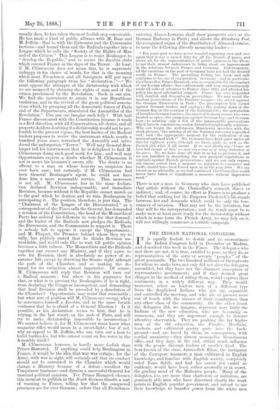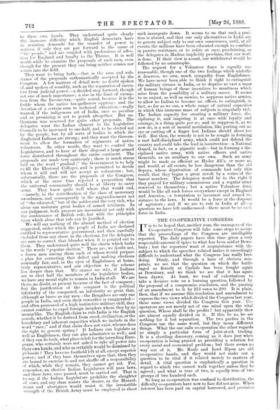THE INDIAN NATIONAL CONGRESS. voters into the field.
-force distributed throughout the entire continent. The ciplined native army, with native officers and native proposals are made very cautiously ; there is much stress Generals, as an auxiliary to our own. Such an army laid on the word " gradual ;" the Government is to help might be made as efficient as Hyder Ali's, or more so, of " the educated," but of the nobles and the very rich, who sistance to the laws. It would be a force at the disposal alone can maintain great bodies of armed retainers. In of agitators ; and if we are to rule in India at all—a our judgment, both prayers are inconsistent not only with question we have left undiscussed—there must be no such the continuance of British rule, but with the principles force in India.
upon which alone that rule can be justified. We will say nothing of the absurd method of election THE CO-OPERATIVE CONGRESS. suggested, under which the people of India are declared I Co-operative Congress will take some steps to secure rn ■ •ntitled to representative government, and then carefully excluded from any share in the elections, for the delegates that the proceedings of the Congress are intelligibly .ire sure to correct that blunder when it is pointed out to reported. The daily papers have this time given a very them. They understand quite well the charm which lurks respectable amount of space to what has been said at Dews- in the words " popular election." There are, we doubt not, bury ; but the reporters' want of acquaintance with the a dozen men among them each of whom would prepare subject to which the speeches related makes it exceedingly a plan for correcting that defect and making elections difficult to understand what the Congress has really been -nominally fair, and, in the eyes of Englishmen at home, doing. Dimly, and through a haze of obvious mis- truly representative, and our objection to the scheme prints, we see that the question on which the battle lies deeper than that. We cannot see why, if Indians raged so fiercely at Carlisle has been fought again are to elect half the members of the legislative bodies, at Dewsbury, and we think we see that it has again we have any moral right to remain in India at all. We are been drawn. At least, we read of exhortations to there, no doubt, at present because of the fact of conquest ; take a decisive vote on a burning question, followed by but the justification of the conquest is the political the proposal of a compromise resolution, and the passing inferiority of the conquered, an inferiority so great that, of an amendment to it by 213 votes to 200. It is plain, although as brave as any men—the Bengalees are only one then, that if we assume this resolution and amendment to -people in India, and even their cowardice is exaggerated— express the two views which divided the Congress last year, and often possessed of a high instinctive military skill, they these same views divided the Congress this year. Co- cannot combine to expel foreign invaders whom they by no operators are not merely not of one mind upon the vital means like. The English claim to rule India is the English question, Whose shall be the profits ? but apparently they morale, whether it be derived from creed, civilisation, or the are almost equally divided on it. If this be so, we see hereditary and inherent capacities which we include in the nothing for it but separation. The two parties in the word " race ;" and if that claim does not exist, whence does Congress use the same word, but they mean different the right to govern spring ? If Indians can legislate as things. What the one calls co-operation the other regards well as Englishmen, they can also administer as well ; and as simply a particular form of joint-stock trading. if they can do both, what place is left for the intruding Euro- It is a startling discovery, coming as it does just when peans, who certainly were not asked to take all power into co-operation is being praised as providing a solution for their own hands, and who as certainly would be dismissed by every social and economical problem ; but there seems no plebiscite? They have no foothold left at all, except superior way out of it. Mr. Neale and Lord Ripon are old power ; and if they base themselves upon that, then they co-operative hands, and they would not make out a are bound to exercise it, and not shuffle off a responsibility question to be vital if it related merely to matters of of which, while they remain, they cannot get rid. For, detail. A vital question is emphatically a question in remember, an elective Indian Legislature will pass laws, regard to which two cannot walk together unless they be and those laws, once passed, must be carried out. That is agreed ; and what is true of two, is equally true of two to say, if the Indian Legislature prohibits the slaughter groups of two hundred each. So long as co-operation was confined to distribution, the of cows, and any class resists the decree, as the Mussul- mans and aborigines would resist it, the irresistible difficulty co-operators have now to face did not arise. When strength of the British Army must be employed to shoot interest has been paid on capital borrowed, and provision. to their own hands. They understand quite clearly I such insurgents down. It seems to us that such a posi- the immense difficulty which English democrats have tion is absurd, and that our only alternatives in India are in resisting demands for the transfer of power to to govern subject only to our own consciences, until, at all natives, if only they are put forward in the name of events, the millions have been educated enough to combine " the people," and are coupled with professions of affec- in passive resistance, or to retire at once, proclaiming, as lion for England and loyalty to the Throne. It is well the delegates in Madras implicitly proclaim, that our work worth while to examine the proposals of such men, even is done. If their view is sound, our withdrawal would be though for the present they can bring neither armies nor followed by no catastrophe. The request for a Volunteer force is equally un- They want to bring both,—that is the sum and sub- reasonable, though one of the two feelings which underlie sta.nce of the proposals enthusiastically accepted by the it deserves, we own, much sympathy from Englishmen. Congress. A few matters of detail were no doubt spoken We have never been able to think it right to extinguish of, and spoken of sensibly, such as the separation of execu- the military virtues in India, or to deprive so vast a mass tire from judicial power,—a decided step forward, though of human beings of those incentives to manliness which not one of much importance ; a rise in the limit of exemp- arise from the possibility of a military career. It seems tion from the Income-tax,—quite sound, because it is the to us unjust, as well as unwise, to suppress native armies, feeble whom the native tax-gatherers oppress ; and the to allow no Indian to become an officer, to extinguish, in ,devotion of a certain sum to technical education,—really fact, so far as we can, a whole range of natural capacities wanted, if the indigenous art of India, once so peculiar in which this immense mass of subjects is singularly rich. and so promising, is not to perish altogether. But en- The Indian capacity for creating a military force, dis- thusiasm was reserved for quite other proposals. The ciplining it, and inspiring it at once with loyalty and delegates want the Indian element in the Legislative courage, is a thing quite per se; and to suppress it, as we Councils to be increased to one-half, and to be elected not now do, is a sort of mental mutilation, like putting out an by the people, but by all sorts of bodies in which the eye or cutting off a finger lest Indians should shoot too Anglicised Indians are strong ; and they want the Govern- well. But then, the remedy is not to be sought in forming ment to allow the formation of regiments of native a vast half-disciplined army, which could not defend the volunteers. In other words, they want to control the country and could take the lead in insurrection—a National Legislatures, and to have at their disposal a large armed Guard, in fact, on a gigantic scale—but in forming a dig- to fill the Electoral Colleges, and is permitted to decide and would, at all events, be less dangerous than the old whom it will and will not accept as volunteers ; but, Sepoys, whose deprivation of commands had only this substantially, these are the proposals of the Congress, result, that they began a great revolt by a series of the which at the same time rejected a proposition that basest murders. The delegates would be in the right if the universal commonalty should be at liberty to carry they prayed for military commissions and a regular army arms. They knew quite well where that would end, reserved to themselves ; but a native Volunteer force —namely, in the revivification of the class of mercenary would be like all such forces everywhere except in England swordsmen, and consequently in the aggrandisement not and America,—a temptation to incessant and armed re-



































 Previous page
Previous page